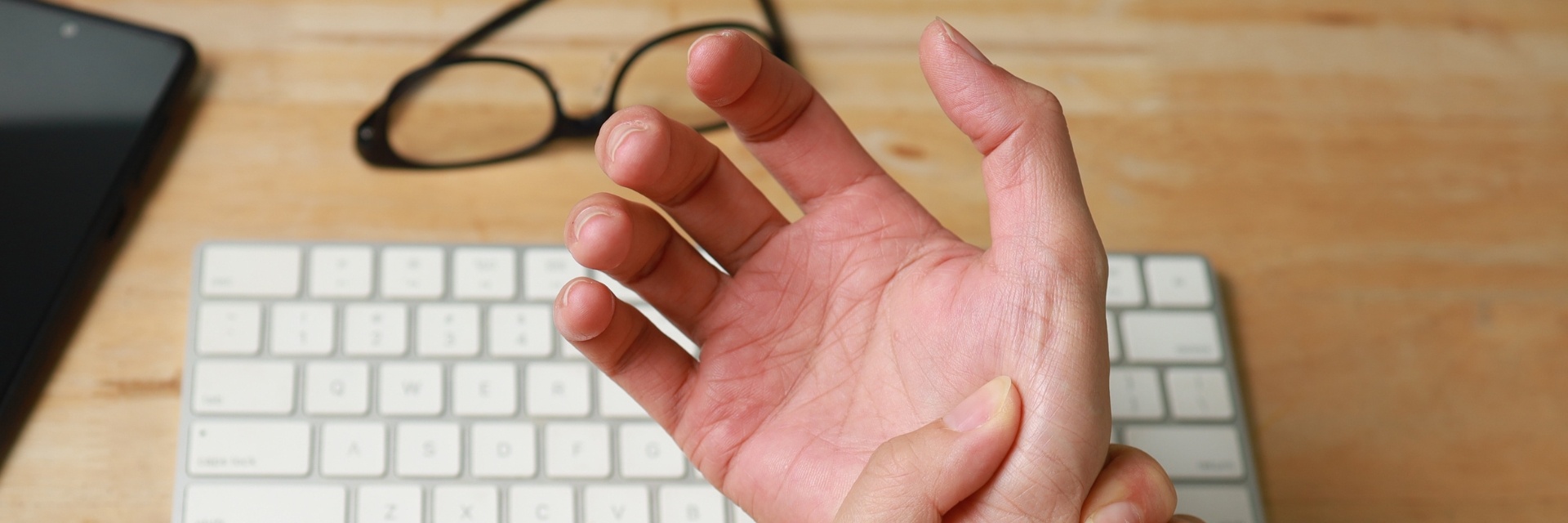February 13th, 2024
Thumb Twitching: Causes and Common Triggers

What is Thumb Twitching
Thumb Twitching is a small, involuntarily, brief movement of the thumb. There is a wide range of possible causes of thumb twitching. Typically, there is no clear reason why the twitching occurs, and it will likely go away without any treatment. If the twitching does not go away within a few days, it is worth further investigating with your primary care doctor and, if needed, a hand surgeon.
Potential Causes and Factors of Thumb Twitching
- Muscular Factors
- Muscle Fatigue and Overuse: Overuse of your hands may cause fatigue by depleting stores of electrolytes and other fuels used by your muscles, any imbalance of these fuels can lead to twitching of muscle fibers.
- Repetitive Movements: Similar to overuse, repetitive movements without appropriate rest periods may lead to imbalance in electrolytes and twitching of muscle fibers.
- Vigorous Exercise and Physical Strain: Aggressive exercise can lead to dehydration and decrease in sufficient oxygen getting to muscles. This can result in muscle cramps and twitching.
- Nervous System Factors
- Stress and Anxiety: An imbalance in certain neurotransmitters in the brain can lead to involuntarily contraction of muscles.
- Neurological Conditions: There is a wide range of neurological conditions that can cause Thumb Twitching.
- Essential Tremor: repeated movement of a body part with a consistent frequency. The cause of this is unknown but it can run in families and is typically benign.
- Neurological Disorders (Amyotrophic Lateral Sclerosis (ALS), Parkinson’s Disease): Both are progressive neurological diseases that can involve twitching and shaking that can affect the hands and arms. It is not typical that these diseases begin with isolated twitching of the thumb, but it is important to be aware that these conditions can start with mild symptoms in the extremities.
- Medication Side Effects
- There are multitudes of medications for various medical problems that can lead to dehydration or imbalance of electrolytes (examples: Medications for blood pressure, kidney problems, cholesterol, etc.).
- Medications that can affect your brain, such as anti-depressants, anti-anxiety medications, sleep medications, and seizure medications, may cause twitching.
- Nutritional Factors
- Dehydration: Any lack of water can lead to malfunction of your muscles because your muscles are not getting the oxygen and nutrients they need. Lack of water means there is an imbalance in the electrolytes and other fuel for your muscles which can lead to muscle dysfunction and twitching.
- Electrolyte Imbalance: Appropriate electrolyte balance is needed for ideal functioning of your muscles. If there is an imbalance, the muscles will not work correctly.
- Vitamins and Mineral Deficiencies: Your muscles and nerves need appropriate levels of vitamins and minerals in order to function correctly. Any deficiency can lead to dysfunction in the muscles.
- Caffeine and Stimulant Intake: Caffeine is a stimulant that can cause overactivity in muscles in your entire body, which can manifest as twitching. Excessive consumption of Caffeine and other stimulants can over-excite your muscles, and can increase twitching.
Symptoms and Characteristics
- Types of Thumb Twitching:
- Minor Twitches: Occasional involuntary movement can occur in the muscles surrounding your thumb. The majority of these will not last longer than a second or two and should not occur for more than a few days.
- Chronic or Prolonged Twitching: Twitches of the thumb that occur throughout the day and last for more than 1-2 weeks.
- Associated Sensations:
- Tingling or Numbness: If you are also having numbness and tingling of your hand or thumb, you should seek medical attention with your primary care doctor or hand specialist.
- Severity and Duration of Twitches: If the twitching causes pain or lasts for more than a few seconds, you should ensure you are well-hydrated, but contact your primary care doctor or a hand specialist if it is not resolving.
Diagnosis and Medical Evaluation
Twitching should also be differentiated from locking, catching, or popping of the thumb, which may be a different problem such as trigger finger, thumb arthritis, or another form of tendonitis.
Some of these other conditions have been come to known as gamers thumb or texting thumb. All are treated with a combination of bracing, anti-inflammatories, activity modification, and possible surgery if the other treatments are unsuccessful:
- Trigger Finger: A form of tendonitis where the tendon gets stuck while bending and straightening the thumb tip. This typically results in painless or painful popping, which is worse in the mornings.
- Thumb Arthritis: A common, degenerative disease that causes pain, swelling, and grinding at the base of the thumb. This is the second most common form of arthritis in the hand.
- De Quervain’s Tenosynivitis:A tendonitis at the thumb-side of the wrist that causes pain with certain wrist and thumb movements. This can occasionally cause thumb catching and locking.
You should seek medical attention if you have continued, painful twitching of the thumb that is not relieved by hydration and rest, you should talk to your primary care doctor or a hand specialist. Try to focus on adjusting your dietary intact and physical activity level to maximize your overall health in the meantime.
A healthcare provider will perform a physical exam to determine the source of the Thumb Twitching. You may have other complaints that are associated with the twitching that can be evaluated. The healthcare professional may obtain additional tests to further investigate the twitching. The diagnostic procedures for Thumb Twitching are as follows:
- Physical Examination: A complete physical exam can help further evaluate the nature of the twitching of your thumb. Sometimes, the twitching may be coming from another area of your hand or arm, which can be further evaluated by the health professional. A physician can also differentiate the thumb twitching from other common problems of the thumb (trigger finger, thumb arthritis, and tendonitis explained previously).
- Electromyography (EMG) / Nerve Conduction Studies (NCS): If recommended by your healthcare provider, EMGs evaluate the function of the nerves throughout your entire upper extremity. This test can help identify different types of nerve pathology or injury.
- Blood Tests: Laboratory tests may be ordered to measure the level of certain markers in your blood. This could include blood cell counts, electrolytes, vitamins, etc.
Identifying Common Triggers and Exacerbating Factors
When creating strategies for recognizing personal triggers, try to note when and how often you experience the thumb twitching. This can be the time of day, day of the week, before or after certain activities. Note how long it persists and how many times per day or per week does it occur.
There are several methods for eliminating, or avoiding triggers for Thumb Twitching. If you know when it typically occurs, the below can help guide you on adjusting your activity to avoid causing the twitching:
- If it is during or after heavy activity, you may be getting dehydrated or fatiguing. Make sure you are consuming enough water during those activities.
- If it is soon after taking certain medications, you can speak to your doctor about the dosages of that certain medication.
- If it is after drinking coffee, you can try reducing your caffeine in-take.
Self-Care Tips and Management Strategies for Thumb Twitching
- Rest and Relaxation Techniques: Although it is very important to stay healthy and active, it is also important to rest and recover after heavy activity. Make sure you stretch before and after strenuous activity and stay hydrated throughout the day. Stretching and massaging your thumb can help relieve discomfort.
- Dietary Adjustments: It is important to have a well-balanced diet in order to maintain a healthy lifestyle. Poor quality dietary intake can lead to poor health, which can put you at risk of many medical problems including dysfunction in your muscles.
- Hydration and Electrolyte Balance: Maintaining a healthy balance of water and electrolyte intake is important to keep your muscles healthy. Any excessive levels of either water or electrolytes can lead to an imbalance, which can cause dysfunction in your muscles and nerves.
- Reducing Stimulant Intake: Excess coffee or caffeine intake can lead to overstimulation of nerves and muscles throughout your body. It is important to consume these in a controlled way.
Key Takeaways
- Thumb Twitching can have multiple causes.
- Most commonly, there is no clear cause of the twitching and it resolves on its own within a few days.
- Possible causes of thumb twitching are fatigue, dehydration, electrolyte imbalances, stress, anxiety, or excess caffeine consumption.
- More rarely, there are neurological conditions that can cause twitching of the thumb.
If Thumb Twitching lasts for more than a few days, becomes painful, or interferes with your daily life, you should seek further treatment with a primary care doctor or with a hand specialist at Rothman.




